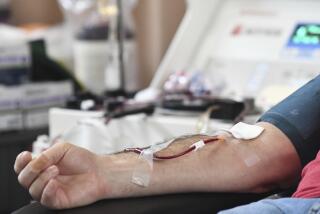Guidelines in Medical Vanguard
- Share via
The idea of xenotransplants, procedures in which animal tissues or organs are transferred from one species to another, including humans, gives many of us the willies. It manages to offend both animal rights activists, who don’t think that “lower” animals should be sacrificed to save us “higher” ones, and those whose pride is injured by the notion that their lives could be saved by pig hearts and baboon bone marrow.
Nevertheless, the number of xenotransplants has been rising steeply in recent months because anti-rejection drugs have made them more effective and because of a serious shortage of human tissue donors. From 1990 to 1995, the organs of an average of 4,835 donors a year were used after their deaths, but many thousands--about 48,000 patients--remain on organ waiting lists.
Recognizing that the frequency of xenotransplantation will continue to rise because of medical demand, the Food and Drug Administration last Friday released the first federal guidelines for the procedure. They sensibly address the legitimate concerns raised by the procedure’s opponents. The AIDS epidemic, for instance, almost certainly began when an African villager ate a monkey that carried the virus or was bitten by one. Xenotransplantation not only can permit such viruses to be spread to humans, it weakens their immune systems with anti-rejection drugs, thus leaving them highly susceptible to infection.
Serious concerns, indeed. But nearly all of them are addressed by the FDA’s new guidelines. The guidelines require doctors to closely observe patients receiving animal organs, to store samples of organ tissues for future investigations and to carefully breed and screen animal donors.
Perhaps most important, the guidelines will benefit transplant recipients like Jeff Getty of San Francisco, who received treated bone marrow from a baboon in January. Back then, his immune system, exhausted by 15 years of fighting HIV, was barely functioning. Since the transplant, Getty’s health grew better, but he had anxiety about whether he might harbor diseases that could spread to his friends, family and community. Now that the FDA has provided the first nationally recognized standards, Getty’s doctor was able to call up a federal agency and get a concrete answer to the question he had asked her for so long: “Can I kiss my family yet?” Yes.
More to Read
Sign up for Essential California
The most important California stories and recommendations in your inbox every morning.
You may occasionally receive promotional content from the Los Angeles Times.













